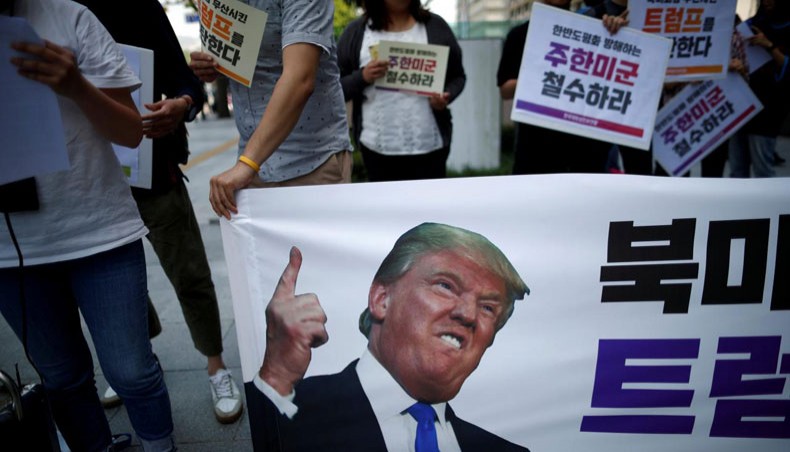One really can’t keep track with the US president’s maneuvring these days. It’s almost like now-you-see-him-now-you-don’t. Didn’t he instantly embrace the news of the South Korean delegation to the White House that Kim Jong-un was ready for a meeting with Washington? Equally stunningly, Trump sent Kim this peculiar letter a couple of days ago, saying that he cancelled the Singapore summit. And now, it appears everything is back on again. A US mission is in Pyongyang for preparatory work.
We all understand what Trump’s intentions are. He wants to look tough and incalculable, beating Kim at his own game. But this strategy seems to be backfiring. As we can observe, Kim is a skilled opponent to be reckoned with, and so far he commands the upper hand in this tussle. To be sure, Kim has been the vicarious agent of Beijing all along and is probably being coached all the way. After all, Kim’s gain will eventually also be China’s.
But this incredible back-and-forth is not only bringing China and North Korea closer together, it is obviously also designed to drive the wedge further in between America and South Korea. And Kim has distinctly been succeeding in this endeavour. The Seoul government has to tread very carefully with its US relationship, but does anyone really believe South Korea will forfeit the chance of a century to make peace with the Northern neighbour? Of course not.
Kim has managed to charm its leaders like no other. Think of his unexpected reaching out through the IOC, then his sister’s diplomatic mission, and the historic meetings with president Moon, again just recently. And he didn’t only charm the politicians. The clear majority of the South Korean population is enchanted with the prospect of the two Korea’s rapprochement. Their attention, or should we even say allegiance, is currently much rather with their neighbours than with America’s hard-earned role in the country.
As my dear professor friend pointed out to me last night, the front pages of several newspapers in Korea and Asia were covered with photo spreads on demonstrations against the apparent efforts of Washington to scuttle the Singapore peace summit. Reportedly, flash polls have indicated that some 87% of South Koreans believe that, if the summit does not succeed, it will be America’s fault. Kim isn’t intimidated by Trump at all. He must be smirking.
It looks like even sharper minds than Trump’s may be at work here. At least the East Asian contingent is being driven by careful coordination. Kim seems to perfectly know when to bark and when to shut up and act in a conciliatory manner. Or did you hear a response of any audible format to that Trump scribble? It actually appears to have been written by Trump himself and not coordinated with his cabinet. A mistake, and Trump shot himself in the foot. Not commenting on it was the formidable reaction.
Questions have been asked what it in fact is that North Korea wants to get out of this summit. Well, clearly Kim is an existentialist whose objective is to carry forward the family’s generational tradition. But it simply cannot be what his grandfather in the 1960/70s declared it to be, namely the reunification of the two Koreas under Pyongyang’s leadership fostered by a nuclear deterrent. Times have moved on, and Kim might just want to best position his country for the future.
But maybe we are all missing the point and it is not that imperative what Kim wants. Maybe it is much more relevant to ask what Xi Jinping wants. The massive presence of the US military on the peninsula has always been a thorn in Beijing’s side, also a reason why North Korea kept enjoying Chinese support as an effective strawman meddling in geopolitics. If the result of such summit was to weaken America in Korea and around the entire region, it would only be in Xi’s interest.
The professor is spot on with his observation. North Korea, South Korea, and China have played this brilliantly. Imagine the colossal US investment in South Korea over half a century. Think of the bailouts, financial aid, the grants, loans here and there, scholarships, military support etc. Enormous political capital has been created over decades. But it is fragile. Grandstanding of Trump’s sort is now endangering this investment and the loyalty of an otherwise incredibly reliable ally.
North Korea, under China’s guidance and South Korea’s inadvertent support, is in the process of effectively turning the tables on Washington. East Asia isn’t lost to America’s pivot, but imprudent strategic moves may well weaken Uncle Sam’s foothold in the region. Even Shinzo Abe, having invested so much in the Trump relationship and all but been spurned, is looking the other way these days, cozying up to Vladimir Putin in St Petersburg and currying favours by asking for his own summit with North Korea.
